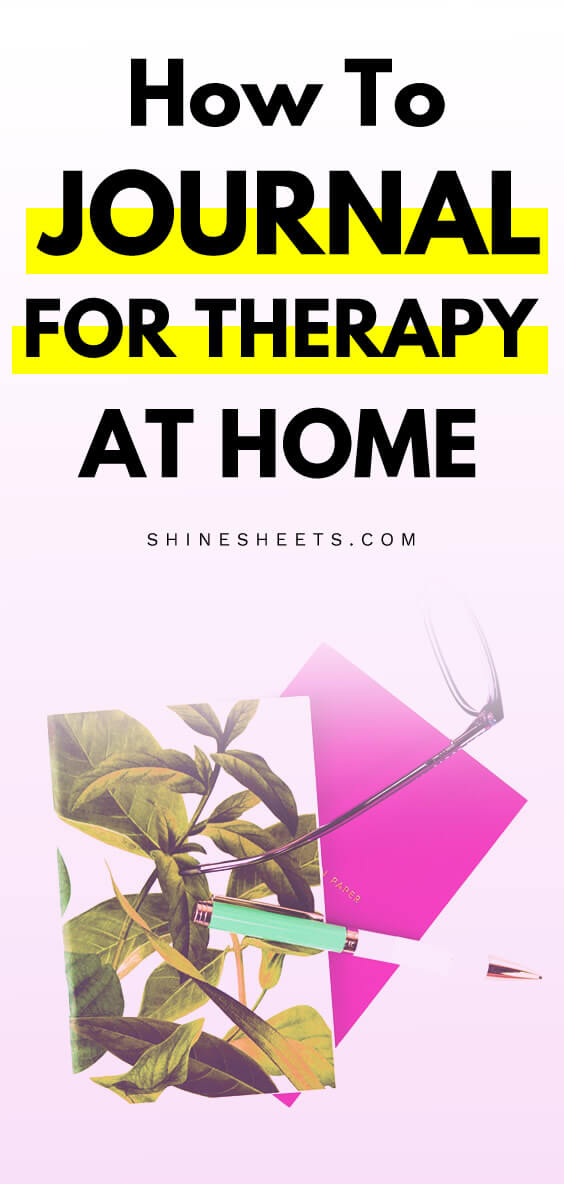
How To Journal For Therapy At Home
We recommend helpful products in our articles. Read our full disclosure here. The content on this website is not intended to be a substitute for professional advice, diagnosis, or treatment.

If you’ve been anxious, stressed, or overwhelmed lately, therapy can be a real lifesaver for you.
Not only can it help you calm down, but it can help you find that much-needed comfort and encouragement in hard times.
That’s no secret.
But often, for many reasons, you might find real therapy not suitable for you.
It might be too far, too expensive or you might feel not ready for it yet.
In that case, using a journal for therapy at home can help you reach a helpful effect.
In fact, therapists all over the world are encouraging their patients to journal for therapy at home as a supplement to talk therapy or a quick self-help tool when real therapy is not available.
In this article, I will show you 4 simple ways to journal for therapy at home so you can reach a therapy-like effect and a relief.
I will also add links to printable journals that you can print, and start journaling right away!
I use them to journal for therapy myself, my readers use them, and they are a simple, effective way to calm down, correct your mindset, and experience at-home therapy when you need it.

Using a Journal For Therapy At Home: Why And How To Do It?
Why Is Journaling Therapeutic?
Using a journal for therapy, either at home or with the help of your therapist is a great way to notice your feelings, regain control of your emotions and improve your mental wellness on a daily basis.
It’s virtually free and can be done anywhere, making a journal for therapy one of the easiest and most helpful ways to deal with negative emotions and unpleasant feelings.
Is Journaling Better Than Therapy?
Talking to a professional is one of the best things you can do for your mental health and sometimes this help is the only way to get better.
However, using a journal for therapy is scientifically proven to be helpful too. One study found out that writing about stressful events helps to improve health outcomes in people with chronic diseases. Keeping a journal for therapy can also improve your immune system, thanks to a release of negative, immune system-repressing thoughts.

Is Journaling a Good Habit?
Definitely, yes!
Whether you’re dealing with stress or living mostly a calm life, journaling daily can help you in so many ways!
Here’s why it’s worth to journal for therapy or self-reflection on a daily basis:
- It helps you to stay in good mental health.
- It allows you to be mindful and fully notice your emotions (which is good for you!).
- It helps you to ditch negative self-talk.
- It teaches you to keep positive self-talk and self-encouragement in your head.
- It can help you to love yourself more.
- It can teach you to deal with difficult situations in a healthier way.
- It can motivate you to keep working on your goals.
- It can help you to solve problems.

How To Journal For Therapy At Home
1. Release anxiety & worries
Writing in a journal for therapy is very useful when you’re anxious or deeply worried about something.
It can help you to see your worry from a perspective and check if you’re anxiety is actually based on real facts.
Many times we’re anxious about something that is not even real or, in other words – not happening at the present moment.
You might find yourself worrying about something that happened in the past, or something that hasn’t even happened yet.
In both cases, worry is created in your head.
You might be safe and well at the moment, but the thoughts and imaginings you’re having are producing most of the anxiety you feel.
A great way to release such worries is by using a simple anxiety journal.
It can help you write down those anxious thoughts and take a more in-depth look at them.
This is perfect for simple situations where just writing your thoughts down is enough.
Related: ThePower Of Anxiety Journal + Where To Get One ASAP
When you need a stronger self-therapy effect, you can try asking yourself several questions that help to dissolve the worry you’re experiencing.
In this case, I recommend using cognitive behavioral therapy as a way to check your thoughts and see if you’re worry is real.
Ask yourself these questions:
- Is my worry happening only in my head?
- Is there anything I can do to change the situation?
If not – do I really need to suffer worrying about it?
- Am I catastrophizing (in other words – making things more significant than they are)?
- What’s the worst that can happen?
And even if it did happen – what are my options?
- Is there anything I can do to help myself feel better in this situation?
Related: How To Help Yourself In Difficult Situations

2. Debunk irrational beliefs
Irrational beliefs are self-taught thinking patterns.
These automatic thoughts come every time something distressing happens and they are usually so deeply engraved in your brain that you don’t even notice them anymore.
Here are a few examples of irrational beliefs:
- Something terrible happens, and you automatically think “it’s always happening to me” when, in reality, it’s might just happen one or two times.
- You make a mistake and automatically think that “you’re a failure and can’t do anything right”.
But this is rarely true.
You might not be super talented in one thing, but be spectacular in another.
- You’re doing something, things are not going 100% perfect, so you think that “it’s not good at all”.
In reality, nothing is completely perfect and there are more colors than just black or white.
- You have a problem and you decide that “there is absolutely no way out”.
Again, in reality, most of the issues have 1 or another solution.
There’s rarely a situation when there are absolutely no ways to solve it.
Getting rid of irrational beliefs can give you a fantastic, liberating effect on your life.
It can teach you new ways to think and help you stop falling into the trap of unrealistic scenarios.
The easiest way to spot and replace irrational beliefs is by using cognitive distortions.
I have included a full page of them in my Thought Workbook to help you debunk your irrational beliefs and help you create a positive mindset even in the hardest situations.
Using a journal for therapy at home works wonders to reveal these distortions and show you the real face of your situation.
You can also learn about positive psychology / cognitive behavioral therapy self-help by reading these books:
They are easy to understand and will help you to learn to reshape negative thoughts, so you can finally live a happier and more balanced life.

3. Just let it all out
Other times you may find yourself feeling pretty well, and not worried about anything at all.
It doesn’t mean that using a journal for therapy at home can’t be useful to you.
Quite the opposite!
Daily journaling can help you support your mental health + prevent those anxiety attacks and irrational beliefs from forming.
The simplest method to journal for therapy is to write your thoughts in a diary.
In this case, you can let yourself lose with writing and just let it all out on the paper!
When I do that, I tend to get amazed by how much self-encouragement I can actually find in myself, without the need to talk to anyone or go to a therapy session.
When writing in a diary, make sure to keep positive self-talk and support yourself.
You already have enough to deal with, so there is absolutely no need to be negative about yourself.
Related: How To Stay Positive When Life Keeps Giving You Problems

4. Work on your mindset
Last but not least, using a journal for therapy can help you to build a positive mindset and resilience.
A perfect way to do that is by practicing daily gratitude and positivity exercises.
Both of them can help you to shift your focus from what’s going wrong to what’s going right – and it can be a pretty powerful secret to staying strong in hard times!
You can read more about gratitude, positivity, and resilience in guides:
5 Ways To Stay Positive With Gratitude
10 Powerful Ways To Stop Being So Negative
How To Build Resilience That’s (Almost) Bulletproof
Using a Journal For Therapy – The Bottom Line
I hope you found at least a few ideas on how to start your own journal for therapy and achieve relief, self-support, or a change in your mindset with a piece of paper and a pen.
Remember – the real change and healing are always happening in your head, whether you do it with a therapist or with a journal.
It’s you who decides to go towards light, happiness, and freedom.
Like these journal for therapy ideas?
Scroll down for more content like this!
"We love to research problems, examine studies, analyze solutions, and share with you ideas that make life healthier. You can learn about us and our editorial standards here. Have suggestions or feedback to share? Send us a message!."













Leave a Comment